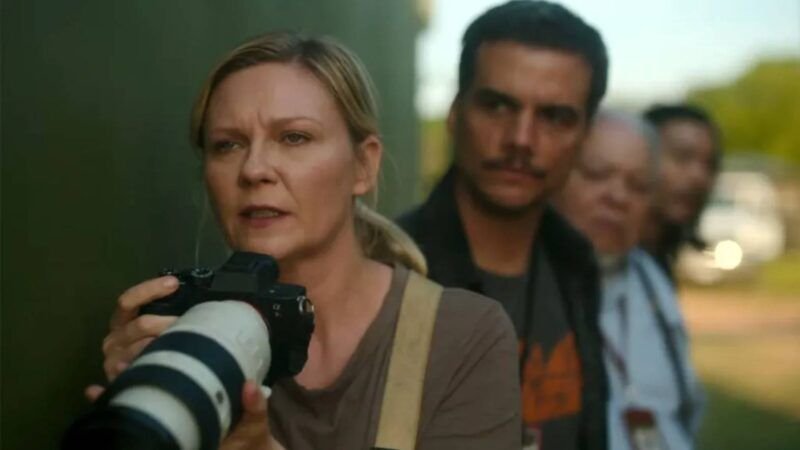CIVIL WAR
Directing: A-
Acting: B+
Writing: C
Cinematography: A-
Editing: B
Special Effects: B+
A movie about a modern American civil war should have a clear point of view, and it should have balls. Alex Garand’s Civil War has neither. It should be noted: the premise alone does not qualify.
I’m not even saying this movie has to make explicit what the political issues were across the country that resulted in armed forces in many states turned secessionists. Garland’s choice to avoid that kind of specificity is actually one of his smart ones. That does not, however, preclude a point of view, something beyond vague notions of “war is bad” or “journalists are soulless.” And notwithstanding the empty complaints among people on the right who clearly haven’t even watched this movie, Civil War really offers very little, story-wise, to hold onto. It’s just a road trip through war-torn country that happens to be America, with some incredibly well directed, gripping, beautifully shot battle sequences.
Even the comparisons of this movie’s American President (Nick Offerman, seen onscreen far less than expected) to President Trump are exaggerated. We know this president is in his third term, that he has ordered air strikes on American citizens (but not how or why), and we know that unlikely groups of people are allied against him. He’s never characterized as a buffoon, or of particularly low intelligence. And yet, the “Western Forces” of California and Texas are allied against him—something that has caused a great amount of chatter among people, on all sides of the political spectrum, as straining plausibility. My stance on this is that far weirder things have happened in times of war, which makes strange bedfellows. Besides, a line early in the film has really stuck with me: “When D.C. falls, they’ll turn on each other.” Indeed, once a common enemy is pushed aside, people previously on the same side are free to find fault with each other.
There are other references to aligned states in throwaway lines in Civil War, such as “The Florida Alliance,” or Midwestern states still loyal to the U.S. government, where small-town residents live their daily lives pretending like none of this is happening. Our protagonist, hardened photojournalist Lee Miller (Kirsten Dunst, truly fantastic) has parents in Colorado doing exactly this. Her very young acolyte photojournalist, Jessie (Priscilla’s Cailee Spaeny, actually 23 years old during production and playing 23, though she barely looks even 18), has parents in Missouri doing the same.
A major problem I have with Civil War is the same problem I have with many dystopian visions of a near future: its refusal to acknowledge race. Does anybody really think there would be a second civil war in the United States and race would have no relevance? There’s a very tense sequence in which Jesse Plemons plays a blithely murderous militia man, and the scene uses two men of Asian descent to illustrate his pointed xenophobia. This is in the same neigborhood as racism, of course, but it’s still distinct from it. But Alex Garland just isn’t interested in going that step further.
This is the fundamental problem with Civil War, which is the cinematic equivalent of a product with claims of nutrition when it actually has none. And don’t get me wrong, there is still a lot to recommend Civil War, which is genuinely gripping from start to finish. But, much like the 2006 film Children of Men, it has too many “why” questions it refuses to answer while it wows us exceptional production. (Children of Men, at least, is far more impressive on a technical and production level, creating a world that feels far more lived in, if just as implausible.)
It’s the ideas themselves that are the problem—or, the lack thereof. This is the kind of movie that you really get into while it’s happening, and can only leave saying it was great if you don’t think too hard about it. Garland, however, is challenging us to think about it, without fleshing out what it’s trying to say. There’s certainly the idea that there are not truly “good guys” in active warfare, and we are never given a side to root for—something these journalists don’t even want, as they pride themselves on supposed objectivity.
And yet, even with journalism being looked at through by far the most critical lense in this film, even that winds up muddled in presentation. Too many of the details make too little sense. “They shoot journalists on sight in the capitol,” we are told early on. Somehow, the armed forces closing in on the capitol welcome press with open arms, no questions asked. Come on, really? And this is hardly a new observation: far too few of the journalists in this film are seen taking video (in fact, I think we see only one or two doing so, and only with a professional news camera—literally not one single character is seen taking video on their smartphone). Lee and Jessie engage with still photography exclusively, albeit with many of the still shots they take being equal parts beautiful and horrifying.
A lot of Civil War is gorgeously shot, which is part of the deeply misleading journey it takes us on. All the plot connections are shaky at best, making this a kind of low-rent Apocalypse Now, even with its often beautiful imagery. I just watched this movie feeling a bit lost as to the actual stakes, and what I was supposed to take away from it. And what I took away from it was its top-notch cinematography, direction, and acting, particularly on the part of Dunst, who has never been better. But what is the whole thing that these parts are coming together to make? Yet another in a long line of supposedly anti-war movies that wow us with its rendering of war, in this case with nothing of any real substance to say.
The Expendables: four journalists face their various fates.
Overall: B

